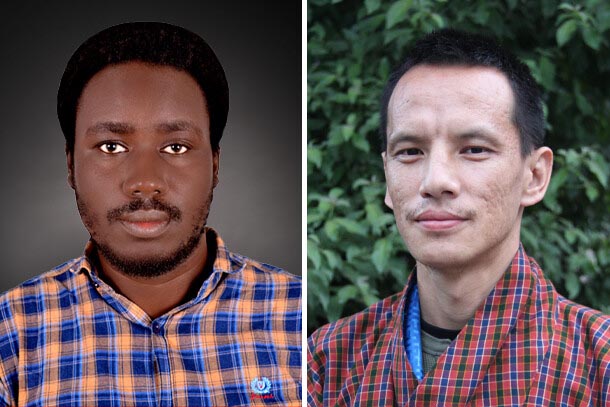
Ali Faragalla (left) and Tandin Norbu, the first recipients of a World Bank-sponsored architectural engineering graduate scholarship, aim to pursue master’s degrees to support building science and construction needs in their home countries. IMAGES: PROVIDED. COMPILATION: PENN STATE COLLEGE OF ENGINEERING
First architectural engineering World Bank scholarship recipients selected
7/29/2021
By Gabrielle Stewart
UNIVERSITY PARK, Pa. — The Penn State Department of Architectural Engineering, selected as a preferred degree program by the World Bank, will welcome its first sponsored international students this fall. The graduate scholarship recipients, Ali Faragalla and Tandin Norbu, will pursue master of engineering degrees in architectural engineering.
“Students who successfully complete the program will be poised to return to their home countries to contribute to their building and construction sectors through the engineering of ultra-high-performance and sustainable buildings,” said Sez Atamturktur, Harry and Arlene Schell Professor and Head of the Department of Architectural Engineering.
World Bank scholarship recipients must be from eligible member countries and have a bachelor’s degree and at least three years of work experience — and the intention to use the knowledge they gain to support the built environment in their home countries upon completion of their degrees. Faragalla and Norbu will each receive a stipend of $2,800 per month for a maximum of $33,600 during their program enrollment and residence in the United States.
Faragalla will focus his studies in construction and engineering management. Currently a teaching assistant in the architecture department at the University of Juba, South Sudan, Faragalla has focused his career on architecture and sustainable development. After completing his bachelor of science in architecture at the university in 2015, Faragalla worked as an assistant architect at SUDARCH & Associates and RBC Consulting Co. Ltd. He also contributed to the United Nations Industrial Development Organization project, which aimed to improve South Sudan’s fisheries sector, by traveling to remote locations to learn about the impact of sustainable construction practices on underdeveloped communities. He is a member of the South Sudan Architecture Forum, an initiative intended to connect the practice of architecture with public impact.
Upon returning to South Sudan after completing his degree, Faragalla plans to continue research and education at the University of Juba while working with government agencies and, eventually, international agencies to advocate for sustainable management practices and development throughout the country.
“My long-term plan is to be a leading researcher and policymaker in the area of architecture, construction industry, development and sustainability,” Faragalla said. “This will greatly impact the South Sudan Architecture Forum by establishing it as a national think tank that will engage with the government agencies and other international development partners to help tackle the pressing issues faced by my country.”
Norbu’s interest in the field was sparked in boyhood when his grandfather told him stories about supervising construction of a bridge that would go on to aid many people in his community. Norbu completed a bachelor of engineering in civil engineering at the Royal University of Bhutan in 2011 and has worked at a private steel plant and a structural design firm. As a civil engineer working for Bhutan’s government, Norbu designed school infrastructure and oversaw school construction projects. In his current role as executive engineer on the government’s Construction Development Board, he assists in researching and developing policies and designing programs that implement best practices and innovations in construction.
Norbu said he aims to develop his knowledge and technical skills surrounding new building science and construction technologies, as well as sustainable development, to better face challenges that impede construction processes.
“With architectural engineering, it is possible to use technology and engineering to design functional, resilient and sustainable buildings,” Norbu said. “The master of engineering program will highlight the importance of sustainability in any engineering process — especially in construction — and provide me with skills in the development of sustainable processes in all phases of construction.”
To contribute to its mission of forging new dynamic approaches to capacity development and knowledge sharing in the development world, the World Bank provides scholarships through its Development Economics Vice Presidency. These awards are components of the World Bank’s efforts to promote economic development and shared prosperity through investments in education, capacity building and developing human resources in the developing world, according the World Bank website.



